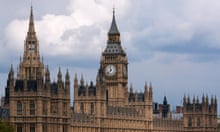G4S shares plunged as police were drafted in to guard the Olympics amid warnings more soldiers will be needed. Yet another outsourcing company collects profits when all goes well and the state picks up the pieces if the company fails. Soon much of the state may be too atrophied to step in.
Exactly a year ago the Cabinet Office published its "open public services" white paper, the masterplan for dismantling the state, with "any qualified provider" the default deliverer of virtually every public service. The Cabinet Office is the ideological hub of the Cameron government's mission to dismantle the state. For fear they might only get one term, as governments everywhere are routinely ousted, they are dashing to secure that indelible legacy. The plan is to outsource so much that reconstructing public services will be impossible in future. Seeing how easily their cuts rubbed out Labour legacies, they have redoubled their intent to leave an ineradicable stamp with this biggest wave of outsourcing ever.
David Cameron warned any civil servants standing in the way of bidders: "If I have to pull those people into my office and get them off the backs of business, then believe me, I'll do it." If the G4S slogan, "Securing Your World", is embarrassing, Cameron's state-demolishing mission faces even worse reputational damage.
Government will always contract and procure from the private sector, but it shouldn't be a matter of ideology. Half of London's councils collect their own bins, the others outsource. Those are easily measured services, yet no one audits and compares, so we don't know which is best. How can you know if the price is right and profits fair with company accounts hidden from view? In-house service costs are at least public and transparent. Margaret Hodge, the dynamic, no-nonsense chair of the public accounts committee, protests that it's impossible to know who profiteers from the public purse. Under the guise of "commercial confidentiality" her committee is denied information with no transparency on value for money. Freedom of information laws don't cover private companies – even when using taxpayers' money.
Often the only "efficiency gain" is paying workers less. One council's bin men I interviewed were on six different pay rates, depending on when they were employed, each new contractor or agency paying less. The lowest paid needed their wages subsidised by the taxpayer via tax credits, so who wins?
Nothing about the "market" in public services is free and fair. Only a small caucus of giant companies have the capability to bid. With a third of Whitehall civil servants cut, their already doubtful ability to write clever contracts weakens further. Local authorities are even more prone to bamboozlement. Council chief executives, often castigated as overpaid, are negotiating with companies whose bosses earn millions, aided by battalions of top-flight lawyers.
Look at the fiendish complexity of IT. Outsourcing consultant ProBenchmark reported last year that four out of five government departments are trapped in their deals. Most contracts are too complex to re-let, so 80% never change supplier. "Market testing sounds right in principle but has huge costs … The tendering process costs more than it saves." The "unpalatable truth", the report concludes, is that big contracts are so complex "only the incumbent can reasonably re-bid". That applies to huge non-IT contracts, impossible to change.
The entire NHS is now open for such business. Puny new clinical commissioning groups negotiating complex contracts are no match for these firms. If Cameron wins a second term, Michael Gove has made clear that chains of free schools will enter the market to make a profit.
A year ago, when Cameron said he would "create a new presumption" that everything was up for auction, he exempted "national security and the judiciary". But he has now put out frontline police work, including crime investigation and detaining suspects, and probation. As the Work Programme unravels, its companies are already protesting at not getting the clients they were promised: will they be allowed to go bust? More likely they'll do as before: demand more money, knowing cuts to jobcentres mean these can't be rebooted to take back this huge workload. These contracts went ahead despite National Audit Office findings that jobcentres scored far better than private firms at getting people into work. Watch what happens to a huge new contract soon for reassessing 3.2 million people on disability living allowance. G4S ran the pilot scheme, so will it get the contract?
Past fiascos include NHS IT, Sats testing, the rural payments agency, the child support agency and some but not all health service PFIs. In Cornwall a PFI for 28 schools collapsed, costing the council £10m; Somerset council and police outsourcing left losses of £31.5m. Ealing council saved £5m bringing its housing back in-house. Great disasters include John Major's British Rail and Gordon Brown's catastrophic London tube public-private partnership. Privatisations of water and the National Grid made fat profits for monopoly providers, money that should be used for reservoirs, leaks and building modern water and electricity grids.
No one can prove the value or cost of most outsourcing. What Thatcher began and Labour continued is an epidemic of evidence-free, faith-based policymaking. Politicians have been seized by a conviction that private is always better. With no public service for fair comparison, the weary old mantras of "monolithic", "sluggish" public services go unchallenged. Some are – but there is no evidence that siphoning profits into private companies is any panacea. One thing is certain. These contracts create moral hazard on a grand scale, where profits are private but losses are ours.





